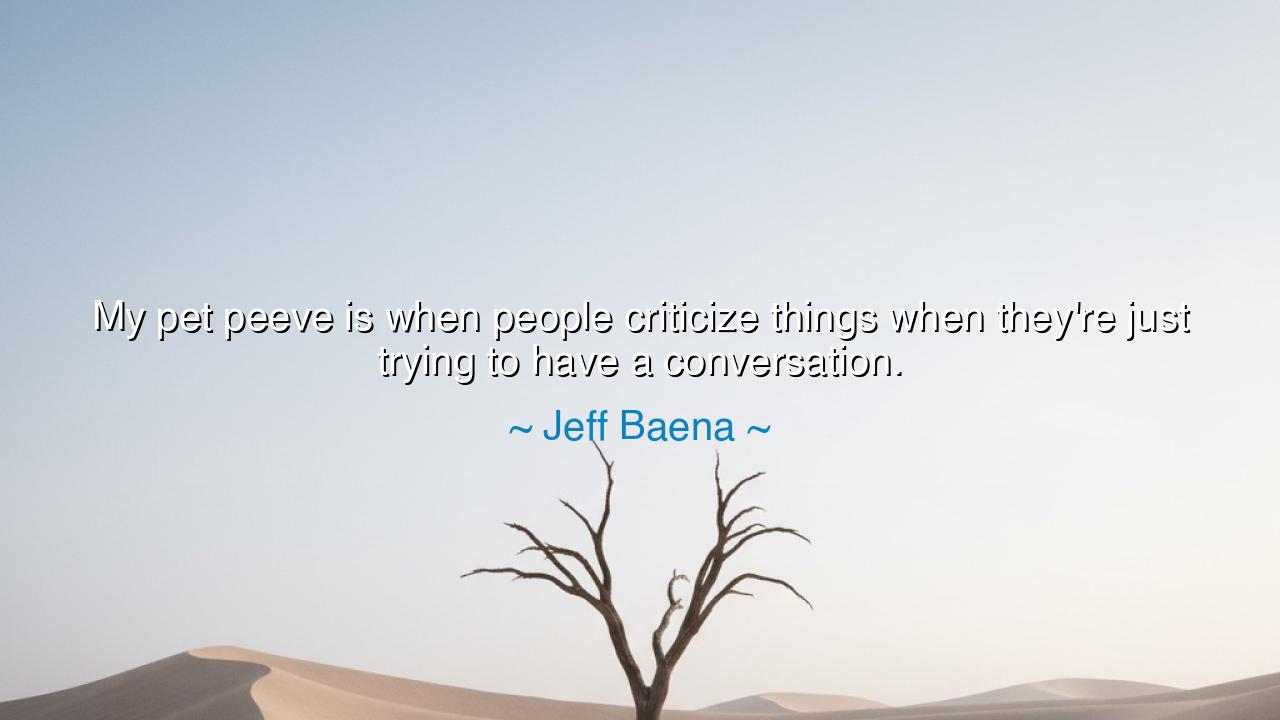
My pet peeve is when people criticize things when they're just
My pet peeve is when people criticize things when they're just trying to have a conversation.






Hear, O keepers of wisdom, the words of Jeff Baena, who spoke thus: “My pet peeve is when people criticize things when they’re just trying to have a conversation.” Though cast in the tone of irritation, his words open a deeper reflection on the sacred art of dialogue, on the balance between listening and judgment, and on the way that conversation, when wounded by needless criticism, can wither instead of flourish. For to speak together is not merely to exchange words, but to share spirit, and when that sharing is met with sharpness, the flow of connection is broken.
The ancients knew that conversation was the root of wisdom. Socrates himself declared that truth was born not from speeches but from dialogue. In the agora, men and women gathered not to tear down but to uncover. Yet even he warned against the sophist, who wielded words like daggers, seeking to win arguments rather than to seek truth. Baena’s grievance springs from this same wound: when one opens the heart in casual exchange, offering thoughts like seeds, and another stomps them with criticism rather than nurturing them, the soil of fellowship is made barren.
Consider the example of President Abraham Lincoln during his early career as a lawyer. Known for his gift of conversation, he would sit with strangers in taverns and homes, letting their words unfold without interruption. He understood that people did not always seek debate—they sought understanding, the comfort of being heard. And because he gave them space, they trusted him, even when disagreements arose. Had he met every utterance with criticism, he would have silenced the very voices that later carried him to leadership.
For conversation, like a fire, requires careful tending. One must add wood, not douse it with water. To criticize needlessly is to cast cold upon warmth, to extinguish the spark before it grows. Of course, there is a time for critique, as the sages remind us—for truth must sometimes cut. But Baena warns of the pet peeve that arises when criticism is misplaced, when what was meant as light exchange is treated as battle. To confuse the two is to harm not only the speaker, but the bond between souls.
The origin of such wisdom lies in the human longing for connection. Every person who speaks desires not only to be understood but to be welcomed. When this desire is met with kindness, relationships deepen; when it is met with criticism, walls rise. Thus, Baena’s words remind us that our task in conversation is not to sharpen our own image, but to build a bridge where two minds may meet without fear.
The lesson, then, is clear: let conversation be a place of generosity. Listen first; judge later, if at all. Ask questions that open rather than close. Recognize that not every word uttered is a thesis to be challenged—sometimes it is only an offering of presence. To honor this offering is to strengthen the thread of community; to scorn it is to fray the cloth of trust.
Practically, this means cultivating patience in speech. The next time you feel the impulse to criticize, pause. Ask yourself: is this moment for correction, or for connection? Choose your words not as weapons but as tools. Let your tone be soft when the moment calls for warmth, and firm only when truth demands it. In this way, you will transform conversation from a battlefield into a sanctuary.
So let these words endure: Do not meet every word with critique, but meet each speaker with respect. For conversation is not conquest, but communion. If we master this, our words will not divide but unite, and we shall leave behind a legacy of dialogue that uplifts rather than destroys.






AAdministratorAdministrator
Welcome, honored guests. Please leave a comment, we will respond soon